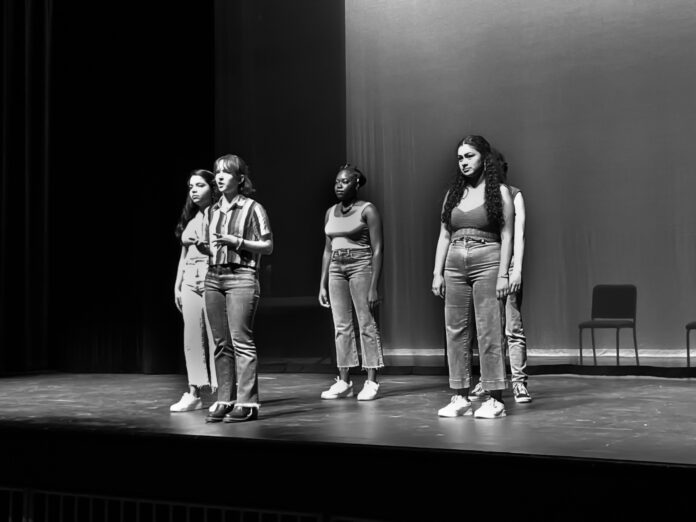
On Friday, Sept. 10, eager students and faculty scanned their e-tickets at the door of the Baker Theatre and took their seats for what would be, for many, their first in-person Muhlenberg performance in roughly a year and a half. This momentous occasion took the form of the community performance of an ongoing staged conversation about issues of campus-wide equity, which takes place on an annual basis, known as the SEDEHI Diversity Project.
The SEDEHI Diversity Project (SDP) is an event sponsored by the Office of Multicultural Life, the Office of the Provost, the Dean of Academic Life and the Dean of Students, is a cross-campus initiative whose goal is to raise awareness for marginalized voices through the collection of anonymous student interviews. With this data, the director and the cast were able to transform the responses into a flowing string of dialogue, spoken over a period of 35 minutes by a cast of students who moved in over the summer to rehearse.
SDP saw its 2021 debut, as per tradition, during first-year orientation week, as the incoming students would be required to attend a viewing of the piece as part of their orientation process.
The ensemble, a group of talented and passionate students, consisted of Sidney Caruth ‘23, Ale Cepeda ‘23, Tessa Forster ‘23, Hannah Goodman ‘23, Hannah Michelson ‘22, Elizabeth Muriel ‘23, Ruhani Singh ‘23 and Brayden Stallman ‘23. It was stage managed by Lauren Koranda ‘23. Singh made the audience aware that this cast was not only made up of theatre students, but of representatives from many academic disciplines.
As the house lights dimmed, the dark blue curtain rose, to reveal the project’s student director, Joey Marcacci ‘23. Marcacci prefaced his speech with a land acknowledgment, stating that “This performance is taking place on stolen Lenape land.” He then went on to provide context for this year’s theme, giving a general content warning that “this performance will be touching on sensitive topics, such as racism, discrimination, COVID-19, mental health, safety, Title IX and campus life.” After a brief word of welcome, the performance began, and did so with a bold, unified statement by the ensemble:
“I feel like a lot of people are saying ‘I hear you,’ but are you understanding?”
Marcacci’s direction was filled with nuance and character, carried by very visceral yet thoughtful touches throughout the performance. One of the most poignant visual attributes of the production was the presence of a semi-transparent screen in the middle of the stage. This was utilized when actors made statements that were outside the realm of any experience they could personally speak to, and symbolized a kind of anonymity.
At certain points throughout the dialogue, performers would step outside of the script, and make statements with reference to their own experiences. When doing so, the performer in question would make an announcement to the audience, following the format of “This is ____ speaking for myself…,” to keep viewers in the loop.
Following the performance, the ensemble members made a line at the front of the stage, and introduced themselves one by one. Marcacci then broke through the applause to inform the audience that there would be a discussion in the area outside of the theatre, in which a number of students would be joined by faculty advisor Leticia Robles-Moreno, P.h.D, assistant professor of theatre, to speak on thoughts or questions from the audience.
“I think that coming off of COVID, it was very important to address the world that we’re leaving and how we’re moving forward,” said Stallman. “We took time to address the history of SDP because activism and the world has changed and grown since the project started in this format.”
Michelson shared, “The end result was really rewarding and to perform it in front of all those students, staff and faculty, I was reminded of why I wanted to be involved in the first place.”
“SDP is a project about accountability,” said Muriel. “Our entire goal is to see how campus culture is doing. How are administrators working on creating a more diverse, equitable and inclusive environment for every student, staff and faculty member on campus?”





















